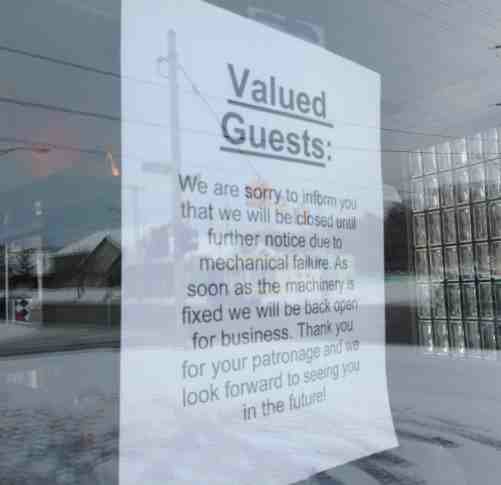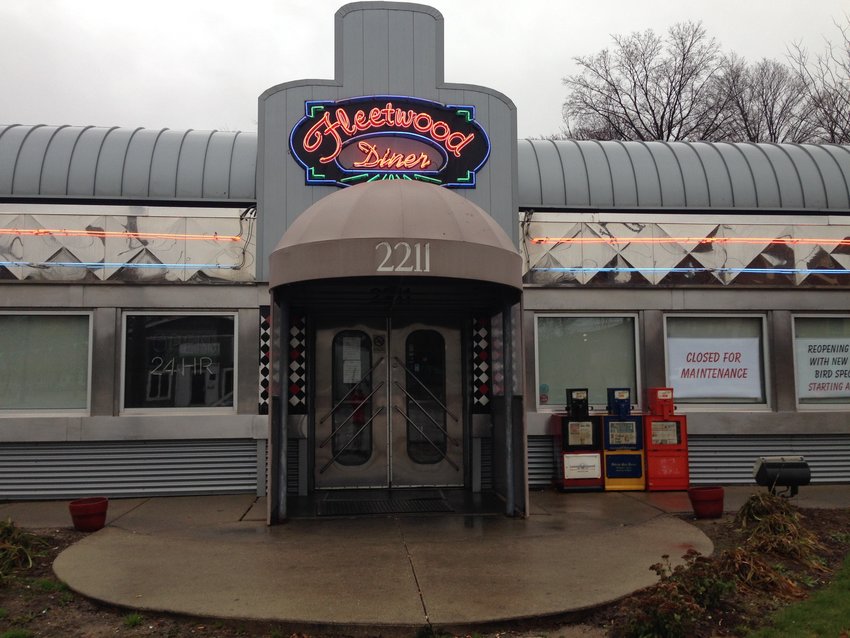WEB UPDATE: The Fleetwood Diner announced on its Facebook page that it reopened Wednesday (11/26) morning.
Darcy Maestrales started to forget things and got massive headaches. Markie Cochran got headaches and had her baby a month early.
Both were waitresses at the fabled Fleetwood Diner on Cedar Street. They say they suffered carbon monoxide poisoning at the diner this summer due to faulty water heating equipment, a defect that was known to management.
The diner was evacuated by the Lansing Fire Department on July 4 after registering CO readings of 105 parts per million. Anything above 35 ppm per hour is unsafe, according to the Michigan Occupational Health and Safety Administration.
Maestrales never returned to work. Cochran did when it reopened a few weeks later. She needed the job and thought it was safe.
The Fleetwood Diner closed again Wednesday, due again to machinery failure.
Cochran quit on Wednesday and said she has filed a complaint with the Michigan Occupational Safety and Health Administration.
“They were being cheap and they didn’t want to close their doors, Cochran said.
Owner Mike Wong said the diner is safe but that he closed it to fix a machine that brings fresh air into the building. He said he knew the intake wasn’t working properly and that he put in place a safety protocol, which he described as keeping the back door of the diner open when the water heater was on.
Silent killer
A silent killer, carbon monoxide is an odorless, colorless gas created when fuels, such as natural gas, gasoline, wood and coal burn incompletely. Unsafe levels of carbon monoxide — 70 ppm or higher at anytime — can cause headaches, fatigue and nausea, increasing to disorientation, unconsciousness and death, according to the U.S. Consumer Product Safety Commission.
Businesses are not required to have CO detectors and only 29 states have code requirements for detectors in residences. Some states require them in schools and hotels.
Installing a carbon monoxide detector, which costs as little as $30, is “highly recommended,” said Eric Weber, a public information officer for the Lansing Fire Department.
Why commercial establishments aren’t required to have them “is a valid question. I don’t know the answer to that.”
‘We wanted to do the right thing’
Cochran said she took a CO detector from home to the Fleetwood Nov. 18 because she suspected the levels were high due to her headaches. She said she had readings as high as 137 ppm when the door was closed and the water heater was on, which she showed City Pulse in a video.
Someone anonymously called the Fire Department Wednesday. The hot water heater was off and no CO readings were found, according to Lansing Fire Captain Maggie Murphy.
The restaurant, known for its “Hippie Hash” breakfast “closed voluntarily,” Wong said.
He explained his solution to the problem this way: “We opened the door so it doesn’t put anyone in danger.”
 Wong said he knew the air unit wasn’t working well by the prior Friday and instructed staff to turn off the water heater until it was needed and open the door for 25 minutes while the water heater was on in order to keep it well ventilated.
Wong said he knew the air unit wasn’t working well by the prior Friday and instructed staff to turn off the water heater until it was needed and open the door for 25 minutes while the water heater was on in order to keep it well ventilated.
“We knew it was back drafting if we did not open the back door,” he said, and blamed the staff for violating his safety protocol to take the video.
“The employees knew there was an issue if you operated a specific way,” he said. “They made it like that so they could get CO readings. They broke safety protocol and they put people in danger.
Cochran said she filmed the video when the dishwashers needed to get hot water.
Why didn’t he just close the diner the Friday he noticed the intake not working?
“There was no issue in the way we were operating, it wasn’t unsafe, he said.
He said he called one contractor Friday who couldn’t come out. Then Monday he said he called Hager Fox but they were also unable to come quickly.
“It was a series of events not in our favor,” he said. “We are not trying to kill anybody. We made it so it’s safe to operate.”
Rod McNeill, director of environmental health for the Ingham County Health Department, said of the Fleetwood Diner closing: “They did the right thing.”
Neither McNeill nor officials at the fire department could say whether the summer and November shutdowns were related.
Wong said he spent nearly $20,000 for a new hot water heater this summer.
The Health Department has limited authority over some mechanical equipment, he said.
What about ventilation in restaurants?
Our code deals tangentially with it,” McNeill said. “What we don’t do is go around with a CO meter. If it appears to be running properly it’s fine.”
Documenting the danger
The waitresses at the Fleetwood refused to think they were crazy.
Maestrales, who has worked there since 2006, began to document everything — she journaled her symptoms, she kept text messages from her bosses, she got her doctor to write a note.
Wong said he only knows of one employee with carbon monoxide complaints.
“I didn’t get sick,” he said. “I don’t know of anyone else that got sick.”
Cochran had her baby a month early on June 22. She wasn’t at the diner for the July shutdown.
She said her midwife and pediatrician believe exposure to CO is “a very likely reason” for the early birth.
Last week was the last straw, she said. She quit and said she filed a complaint with OSHA and the Better Business Bureau.
Maestrales said she would tell remaining staff, “Don’t accept these kinds of working conditions. You can die.”
Wong said he advocates CO detectors for businesses and said he installed one in the diner.
He believes the waitresses who have come forward are planning to sue the restaurant.
The update on repairs is that Wong believes they can get two bearings replaced rather than replace the whole unit. If all goes well the diner will be open by Friday.
If I felt that there was a danger to myself I would not have anybody work in that environment, Wong said. That’s the bottom line.”
Support City Pulse - Donate Today!
Comments
No comments on this item Please log in to comment by clicking here